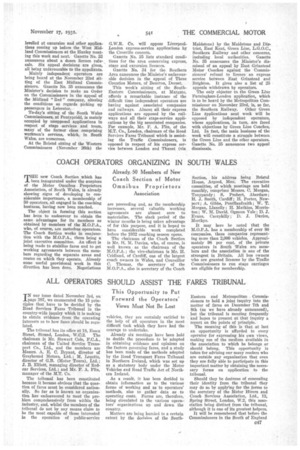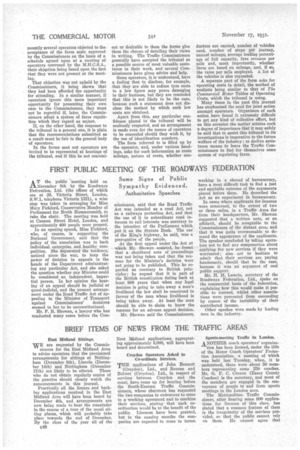ALL OPERATORS SHOULD ASSIST THE FARES TRIBUNAL
Page 69

Page 70

If you've noticed an error in this article please click here to report it so we can fix it.
This Opportunity to Put Forward the Operators' Views Must Not Be Lost IN our issue dated November 3rd, on page 387, we enumerated the 15 principles that have to be decided by the Road Services Fares Tribunal in the country-wide inquiry which it is making to obtain evidence from the operating interests as to how fares should be regulated.
The tribunal has its office at 18, Essex Street, Strand, London, W.C.2. The chairman is Mr. Stewart Cole, F.C.A., chairman of the United Service TrallSport Co., Ltd., and the members are Messrs. A. E. C. Bryant, director of Greyhound Motors, Ltd.; M. Logette, director of G.B. (Motor Tours), Ltd.; J. B. Elliott, managing director of Redcar Services, Ltd.; and Mr. F. A. Flin, manager of the M.T. Co.
The tribunal has been constituted because it became obvious that the question of fares must be considered nationally. So far as is known no organization has endeavoured to meet the problem comprehensively from within the industry, and, whilst the members of the tribunal do not by any means claim to be the most capable of those interested in the operation of public-service
vehicles, they are certainly entitled to the help of all operators in the most difficult task which they have had the courage to undertake.
Already six meetings have been held to decide the procedure to be adopted in obtaining evidence and opinions on the factors governing fares, and a study has been made of the methods adopted by the Road Transport Fares Tribunal in Northern Ireland, which was set up as a statutory body under the Motor Vehicles and Road Traffic Act of Northern Ireland.
As a result, it has been decided to obtain information as to the various forms of working and as to operators' methods, also to gather data as to operating costs. Forms are, therefore, being circulated to the various operators' organizations up and down the country.
Matters are being hurried to a certain extent by the deeisinn of the South
Eastern and Metropolitan Commissioners to hold a joint inquiry into the matter of fares on December 7th and 8th (as we have already announced), but the tribunal is meeting frequently and hopes to present at that inquiry a report on the points of principle.
The meaning of this is that at last an opportunity is afforded to every operator for expressing his own views, making use of the medium available in the association to which he belongs or should belong. This opportunity is taken for advising our many readers who are outside any organization that even they are fully able to participate in this important matter by obtaining the necessary forms on application to the tribunal.
Should they be desirous of concealing their identity from the tribunal they may do so by apply4sag for the forms to the secretary of the Motor Hirers and Coach Services Association, Ltd., 12, Spring Street, London, W.2, this association being distinct from the tribunal, although it is one of its greatest helpers.
It will be remembered that before the Commissioners in the South of England recently several operators objected to the acceptance of the fares scale approved by the Commissioners on the basis of a schedule agreed upon at a meeting of operators convened by the M.H.C.S.A., their objection being based upon the fact that they were not present at the meeting.
That objection was not upheld by the Commissioners, it being shown that they had been afforded the opportunity for attending. In a similar manner, if operators ignore this more important opportunity for presenting their own ease to the Commissioners, they must not be regretful if, later, the Commissioners adopt a system of fares regulation which they regard as unjust.
If, on the other hand, the response to the tribunal is a general one, it is plain that the recommendations submitted as a result must be fair to the general body of operators.
In the forms sent out operators are invited to be represented at hearings of the tribunal, and if this be not conveni
ent or desirable to them the forms give them the chance of detailing their views in writing. The Traffic Commissioners generally have accepted the tribunal as a possible source of most valuable assistance in their work, and several Commissioners have given advice and help.
Some operators, it is understood, have a feeling that to disclose, for example, that they are able to reduce tyre costs to a low figure may prove damaging to their business, but they are reminded that this is not likely to be the case, because such a statement does not disclose the method by which such low costs are obtained.
Apart from this, any particular confidence placed in the tribunal will be zealously respected, and an arrangement is made even for the names of operators to be concealed should they wish it, by the use of identification numbers.
The form referred to is filled up by the operator, and, under various headings, asks for such information as route mileage, nature of route, whether con
ductors are carried, number of vehicles used, number of stops per journey, annual mileage, average loading percentage of full capacity, fare revenue per mile and, most importantly, whether fares are based on mileage, and, if so, the rates per mile employed. A list of the vehicles is also requested.
A separate part of the form asks for operating costs in detail, the method of analysis being similar to that of The Commercial Motor Tables of Operating Costs, which the tribunal is using.
Many times in the past this journal has emphasized the need for joint action amongst operators. Organizers of such action have found it extremely difficult to get any kind of collective effort, but on this occasion the matter attains such a degree of importance that it may safely be said that to assist this tribunal in its investigations is imperative to the future welfare of the industry ; to decline assistance means to leave the Traffic Commissioners to find for themselves some system of regulating fares.












































































































